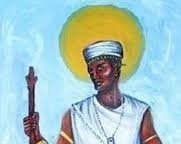Orisha Oko is the Yoruba god of agriculture, fertility, and law. 'Orisha,' is a Yoruba word that means 'god' or 'higher entity.' He is especially revered by the Yoruba people in the western region of Africa as well as the Caribbean and Brazil.
Oko is celebrated on March 22 and Monday is a day to honor him.
WHO IS ORISHA OKO?
The Yoruba people live in Western Africa, specifically Nigeria and the Benin Republic. In Brazil, he is known as Ocô. He is a powerful god within the pantheon.
He is a close friend of Ogiyan and Shango and was married to Yemaya.
Read our article on Yemaya: Mother goddess
Oko is associated with the harvest of white African yams. He oversees the topsoil and the crops. He is also a God of Fertility and stories say that he drug his large testicles along the soil causing plants to spring forth with life.
Oko is Orisha's judge, according to tradition. In the event of a quarrel, he intervenes to settle the disagreement. He serves as the trial judge for the other gods. He is a defender and protector of women.
Orisha Oko ensures the prosperity of the crops, his messengers are the bees and he represents prosperity and fertility. Wikimedia.
Farmers bring their produce to Oko for blessing before selling it at the market. When each crop is planted, the Yoruba give thanks by offering sacrifices of their crops.
Bees are his messengers and spirit animals. He is symbolized by the honey bee and is seen as a hard worker and one who cares about his community.
What Does Orisha Oko Look Like?
He carries a staff and plays a bone flute while dressed entirely in white clothing. Reproductions of his staff are made and used during agricultural celebrations. Traditionally the staff was made of wood but in more contemporary times the staff is made of iron.
The staff is a phallic symbol representing fertility and protection of the farmer and their crops. The top is often adorned in beads of red and white for fertility.
Yoruba priests of Orisha-Oko can be men or women. As a symbol of their priesthood, they have a red and white vertical line drawn over their foreheads.
In the Caribbean, he is often represented holding two coconuts which are a symbol of his testicles and fertility.
Check out our YouTube channel
Correspondances
Animals: Bees, dove, rooster, and goat.
Crystals and Gemstones: Tourquise in red, pink, or lilac colors. Coral was also used traditionally however purchasing coral is unsustainable. The colors red and white which symbolize blood and sperm are associated with Oko as a god of fertility.
Divination: The number 7
Offerings: Fruit, dried meats, yams, and beans.
Music: Flute and drums
Tools: Farm Tools such as plow and harrow.
Honor Oko
Add plants and a bowl of the earth to your altar to worship Oko.
Add a statue of him to your garden
He loves flute music and dancing with drumming
Pray to Oko when you or your partner, are attempting to become pregnant.
Pray to Oko when you are trying to improve your diet and eat healthier
Cook him some yams or sweet potatoes
ORISHA OKO'S ORIGIN STORY
According to an ancient Yoruba legend, Orisha-Oko was initially the chieftain of the city of Irawo, where he was a successful farmer and community leader. When he died his body disappeared and a staff was left in his field.
The people of the village realized he was not human but a deity.
A group of Santería practitioners performed the Cajón de Muertos ceremony in Havana in 2011. Photo by Jorge Royan
Santeria
Santeria also called Regla de Ocha, is a related religion practiced in the Caribbean and the southern United States. They are descended from the Africans forcibly relocated during the slave trade.
They brought their culture and religion to the Americas where it merged with Catholicism and spirituality.
Santeria worships multiple gods from the Yorusha culture and is popular in Cuba and Puerto Rico.
Author, Imani Williams, is a college student studying social work. She has been a kitchen/cosmos witch for four years. Imani is very interested in divination and spell casting.






Cultures around the world have practiced tattooing in many different forms. Deciding to get a tattoo and what the design should be is a complex process (or should be).